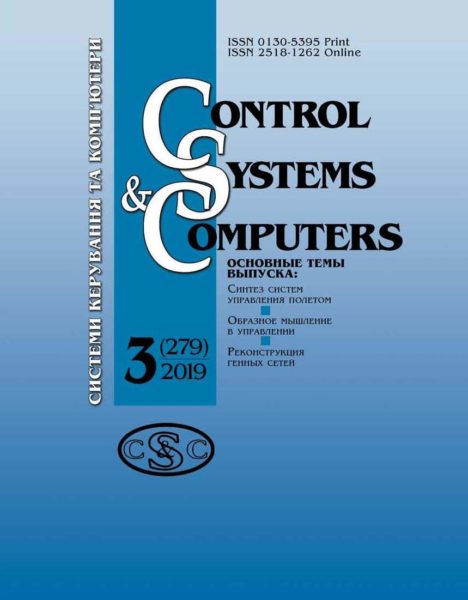Control Systems and Computers, N4, 2019, Article 2
https://doi.org/10.15407/csc.2019.04.014
Control Systems and Computers, 2019, Issue 4 (282), pp. 14-26.
UDK 007:330.341
V.Yu. Meytus, Doctor Phys.-Math., Researcher Associate, Department Head , International Research and Training Centre of Information Technologies and Systems of the NAS and MES of Ukraine, Acad. Glushkov ave., 40, Kiev, 03187, Ukraine, vmeitus@gmail.com
A.I. Morozova, Chief engineer-programmer, Department virtual systems, International Research and Training Centre of Information Technologies and Systems of the NAS and MES of Ukraine, Acad. Glushkov ave., 40, Kiev, 03187, Ukraine,
dep190@irtc.org.ua
L.Yu.Taran, Chief engineer-programmer, Department virtual systems, International Research and Training Centre of Information Technologies and Systems of the NAS and MES of Ukraine, Acad. Glushkov ave., 40, Kiev, 03187, Ukraine,
dep190@irtc.org.ua
V.P. Kozlova, Research Associate, Department virtual systems,
International Research and Training Centre of Information Technologies and Systems of the NAS and MES of Ukraine, Acad. Glushkov ave., 40, Kiev, 03187, Ukraine, dep190@irtc.org.ua
N.V. Maidaniuk, Junior Research, Department virtual systems, International Research and Training Centre of Information Technologies and Systems of the NAS and MES of Ukraine, Acad. Glushkov ave., 40, Kiev, 03187, Ukraine, n.maydan
CYBER-PHYSICAL SYSTEMS AS THE BASIS
FOR THE INTELLECTUALIZATION
OF «SMART” ENTERPRISES
Introduction. The work is devoted to the composition, structure and content of cyber-physical systems, which are the information basis of “smart” enterprises.
Purpose. The purpose of the work is to detail the use, presentation and role of cyber-physical systems, and based on such systems to consider the transition to the intellectual capabilities of the enterprise.
Method. The research method is based on the structuring of the main functions performed by the cyber-physical system. The concept of a “smart” enterprise is considered, proceeding from the possibility of constructing intelligent algorithms using the information model.
Results. Areas of application of cyber-physical systems and their tasks as an information component of a “smart” enterprise are determined, a scheme of transitions to the implementation of intellectual capabilities in enterprise management is proposed.
Conclusion. Cyber-physical systems are the basis for building an enterprise information model. In the future, this model is used to improve management and the transition to algorithms associated with human intellectual abilities.
Download full text! (In English)
Keywords: «smart» enterprise, cyber-physical systems, information model, intellectualization.
- Gurjanov, A.V., Zakoldaev, D.A., Shukalov, A.V., Zharinov, I.O., Kostishin, M.O., 2018. “Industry 4.0 digital production organization based on cyber and physical systems and ontologies”. Scientific and Technical J. of Information Technologies, Mechanics and Optics, 18 (2), pp. 268-277 (in Russian). doi: 10.17586/2226-1494-2018-18-2-268-277.
https://doi.org/10.17586/2226-1494-2018-18-2-268-277 - Foundations for Innovation in Cyber-Physical Systems. Workshop Report , Energetics Incorporated Columbia, Maryland, 2013, 60 p.
- Airport with us, Everything lands where it belongs too – Airfreight, Baggage, jn-board catering and Yourself. SICK Sensor Intelligence, 2015.
- Arthur, D., 2015. Little. Digital Transformation on Airport Economics.
- Elektronnyy resurs. [online] Available at: <https://www.epravda.com.ua/news/2019/07/14/ 649642/> [Accessed 17 Jan. 2019]. (In Russian).
- Letichevskiy, A.A., Letichevskiy, A.A. ml., Skobelev, V.G., Volkov, V.A., 2017. “Kiberfizicheskiye sistemy”. Kibernetika i sistemnyy analiz, 53 (6), pp. 3 -19. (In Russian).
- Bradley, J.M., Atkins, E.M., 2015. “Optimization and Control of Cyber-Physical Vehicle Systems”. Sensors (Basel), 15(9), pp. 23020-23049.
https://doi.org/10.3390/s150923020 - Lee, E.A. Cyber Physical Systems: Design Challenges. [online] Available at: <http://citeseerx.ist.psu. edu/viewdoc/download?> [Accessed 20 Jan. 2019], doi= 10.1.1.156.1012&rep=rep1 &type=pdf.
- Song, Z., Chen, Y.Q., Sastry, C.R., Tas, N.C., 2009. Optimal Observation for Cyber-Physical Systems: A Fisher-Information-Matrix-Based Approach. London: Springer-Verlag, 171 p.
https://doi.org/10.1007/978-1-84882-656-4 - Rajkumar, R., 2012. “A cyber-physical future”, Proc.IEEEE, Special Centennial Issue, 4 (1), pp.1309-1312.
https://doi.org/10.1109/JPROC.2012.2189915 - Tricaud, C., Chen, Q, 2009. “Optimal mobile actuator/sensor network motion strategy for parameter estimation in a class of cyber physical systems”, Proc. American Control Conf., St.Louis, MO, pp.367-372.
https://doi.org/10.1109/ACC.2009.5160289 - Liu, Ya., Peng, Yu, Wang, B., Yao, S., Liu, Z., 2017. Review on Cyber-physical Systems. IEEE/CAA J. of Automatica Sinica, 4(1), pp. 27-40.
https://doi.org/10.1109/JAS.2017.7510349 - Kupriyanovskiy, V.P., Namiot, D.Ye., Sinyagov, S.A., 2016. “Kiber-fizicheskiye sistemy kak osnova tsifrovoy ekonomiki”. Int. J. of Open Information Technologies, 4 (2), pp.18-25. (In Russian).
- Meytus, V.Yu., 2018. “Problemy postroyeniya intellektual’nykh sistem. Urovni intellekta”. Kibernetika i sistemnyy analiz, 4, pp. 32-44. (In Russian).
https://doi.org/10.15407/kvt191.01.032 - Oursatyev, A.A., 2016. “Some Frameworks for Big Data Analytics and Machine Learning”. Upr. sist. maš., 5, pp. 62-75. (In Russian).
https://doi.org/10.15407/usim.2016.05.062 - NIST Big Data Interoperability Framework: V. 1, Definitions Final Version 1. [online] Available at: <http://dx.doi.org/10.6028/ SP.1500-1> [Accessed 5 Apr. 2019].
- DRAFT NIST Big Data Interoperability Framework: V. 2, Big Data Taxonomies. [online] Available at: <http://dx.doi.org/10.6028/ NIST.SP.1500-2> [Accessed 5 Apr. 2019].
- Dean, J., 2014. Big Data, Data Mining, and Machine Learning: Value Creation for Business Leaders and Practitioners. Wiley, 2014 by SAS Institute Inc.
https://doi.org/10.1002/9781118691786 - Franks, B., 2014. The Analytics Revolution: How to Improve Your Business By Making Analytics Operational In The Big Data Era. Wiley, Hoboken, NJ, 304 p.
https://doi.org/10.1002/9781118936672 - Kulagin, M., Volkov, I. Promyshlennyy internet na praktike. Udalennaya diagnostika stankov s CHPU s pomoshch’yu tekhnologii Winnum. [online] Available at: <https://controlengrussia.com/internet-veshhej/winnum_iot/> [Accessed 15 Apr. 2019].
- Gritsenko, V.I., Timashova, L.A., 2016. “”Smart Enterprise” as a Basic Object of the Digital Economy, Upr. sist. maš., pp. 54-61. (In Russian).
https://doi.org/10.15407/usim.2016.05.054 - Gritsenko, V.I., Meytus, V.Yu., 2018. “Umnoye” predpriyatiye – vneshniy kontseptual’nyy podkhod, (in print) (In Russian).
Received 18.08.2019



